Roberts A.D. The Cambridge History of Africa, Volume 7: from 1905 to 1940
Подождите немного. Документ загружается.

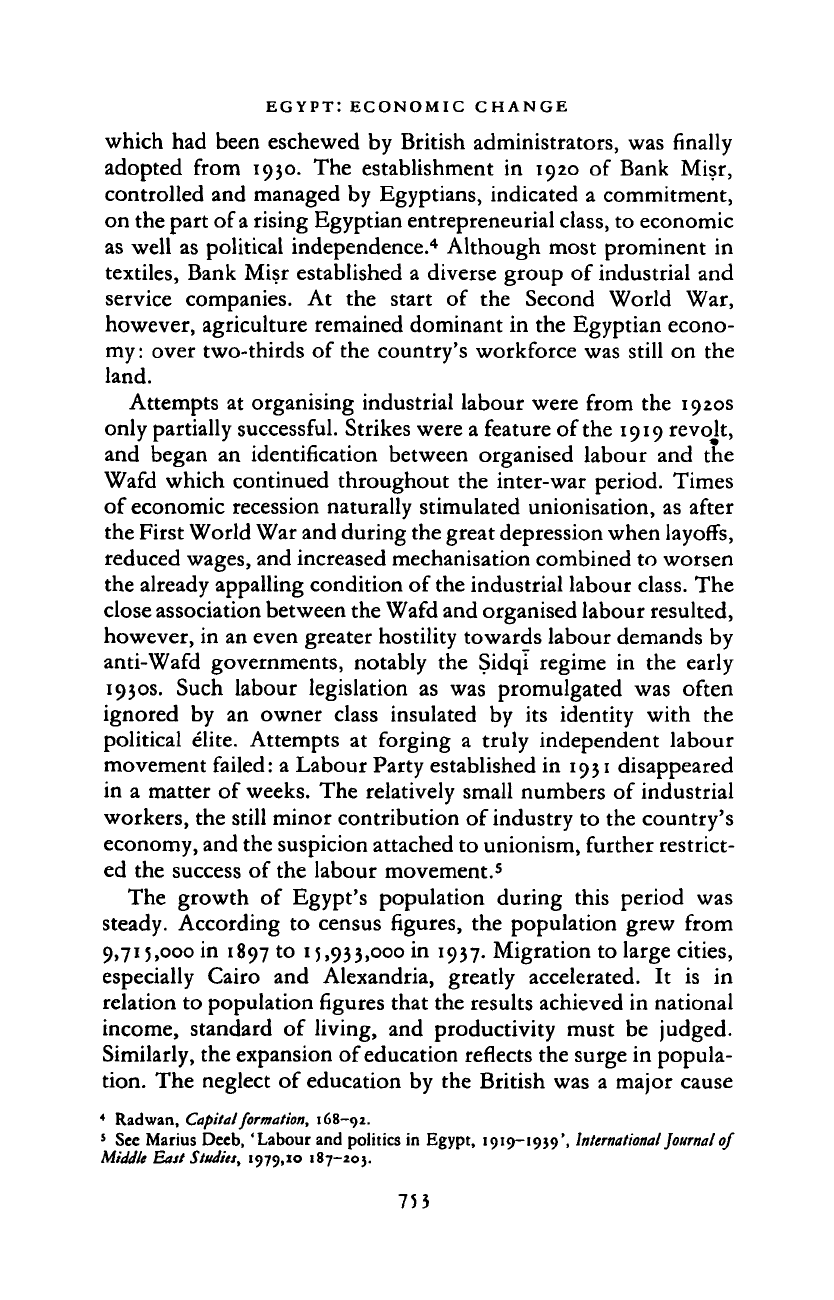
EGYPT: ECONOMIC CHANGE
which had been eschewed by British administrators, was finally
adopted from 1930. The establishment in 1920 of Bank Misr,
controlled and managed by Egyptians, indicated a commitment,
on the part of a rising Egyptian entrepreneurial class, to economic
as well as political independence.
4
Although most prominent in
textiles, Bank Misr established a diverse group of industrial and
service companies. At the start of the Second World War,
however, agriculture remained dominant in the Egyptian econo-
my :
over two-thirds of the country's workforce was still on the
land.
Attempts at organising industrial labour were from the 1920s
only partially successful. Strikes were a feature of the 1919 revolt,
and began an identification between organised labour and the
Wafd which continued throughout the inter-war period. Times
of economic recession naturally stimulated unionisation, as after
the First World War and during the great depression when layoffs,
reduced wages, and increased mechanisation combined to worsen
the already appalling condition of the industrial labour class. The
close association between the Wafd and organised labour resulted,
however, in an even greater hostility towards labour demands by
anti-Wafd governments, notably the Sidqi regime in the early
1930s. Such labour legislation as was promulgated was often
ignored by an owner class insulated by its identity with the
political elite. Attempts at forging a truly independent labour
movement failed: a Labour Party established in 1931 disappeared
in a matter of weeks. The relatively small numbers of industrial
workers, the still minor contribution of industry to the country's
economy, and the suspicion attached to unionism, further restrict-
ed the success of the labour movement.
5
The growth of Egypt's population during this period was
steady. According to census figures, the population grew from
9,715,000 in 1897 to 15,933,000 in 1937. Migration to large cities,
especially Cairo and Alexandria, greatly accelerated. It is in
relation to population figures that the results achieved in national
income, standard of living, and productivity must be judged.
Similarly, the expansion of education reflects the surge in popula-
tion. The neglect of education by the British was a major cause
4
Radwan, Capital formation, 168-92.
s
See Marius Deeb, 'Labour and politics in Egypt, 1919-1939',
International
journal of
Middle East Studies, 1979,10 187-203.
753
Cambridge Histories Online © Cambridge University Press, 2008
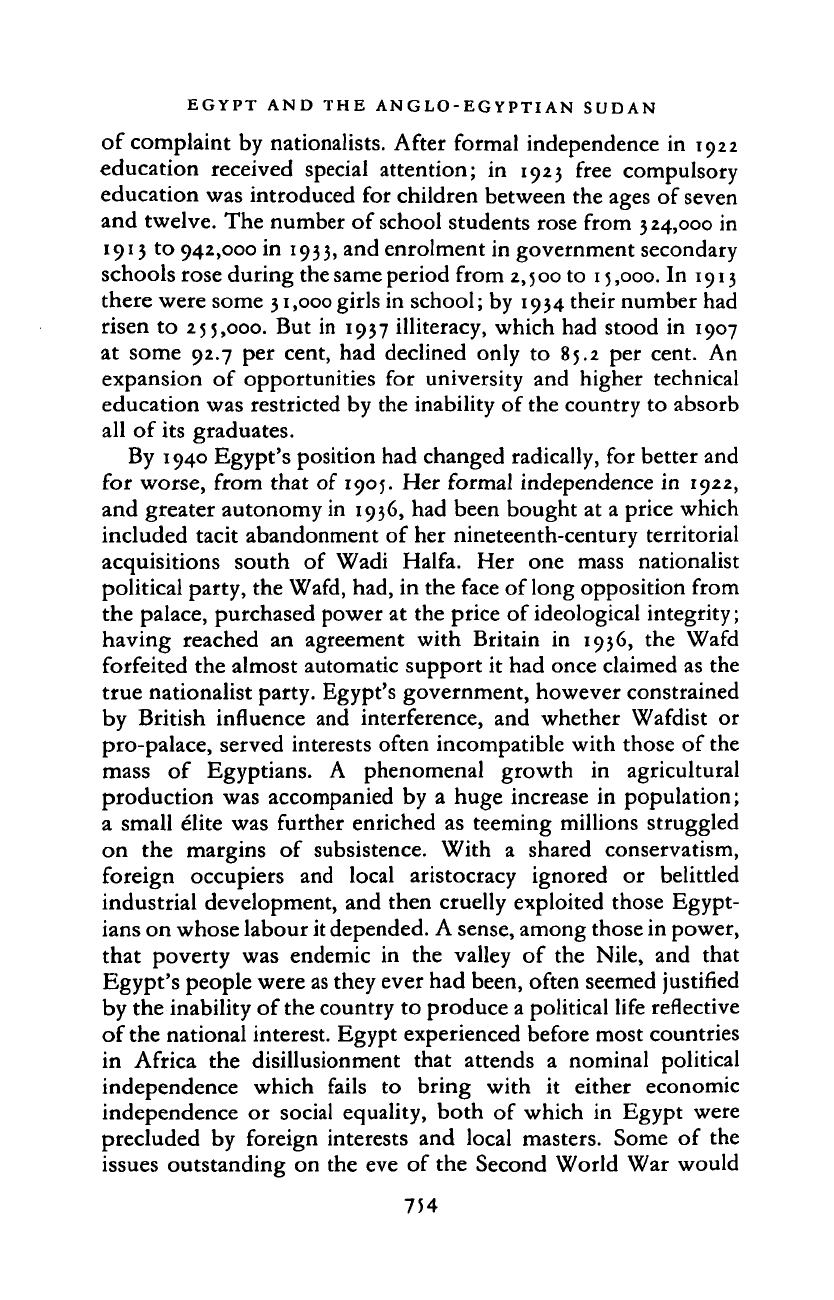
EGYPT AND THE AN GLO-EG YPTI AN SUDAN
of complaint by nationalists. After formal independence in 1922
education received special attention;
in
1923 free compulsory
education was introduced for children between the ages of seven
and twelve. The number of school students rose from
3
24,000 in
1913 to 942,000 in
1933,
and enrolment in government secondary
schools rose during the same period from 2,5 00 to 15,000. In 1913
there were some 31,000 girls in school; by 1934 their number had
risen
to
255,000. But in 1937 illiteracy, which had stood
in
1907
at some 92.7 per cent, had declined only
to
85.2 per cent.
An
expansion
of
opportunities
for
university and higher technical
education was restricted by the inability of the country to absorb
all
of
its graduates.
By 1940 Egypt's position had changed radically, for better and
for worse, from that
of
1905. Her formal independence in 1922,
and greater autonomy in 1936, had been bought at a price which
included tacit abandonment
of
her nineteenth-century territorial
acquisitions south
of
Wadi Haifa.
Her one
mass nationalist
political party, the Wafd, had, in the face of long opposition from
the palace, purchased power at the price of ideological integrity;
having reached
an
agreement with Britain
in
1936,
the
Wafd
forfeited the almost automatic support
it
had once claimed as the
true nationalist party. Egypt's government, however constrained
by British influence and interference, and whether Wafdist
or
pro-palace, served interests often incompatible with those of the
mass
of
Egyptians.
A
phenomenal growth
in
agricultural
production was accompanied by
a
huge increase
in
population;
a small elite was further enriched
as
teeming millions struggled
on
the
margins
of
subsistence. With
a
shared conservatism,
foreign occupiers
and
local aristocracy ignored
or
belittled
industrial development, and then cruelly exploited those Egypt-
ians on whose labour it depended. A sense, among those in power,
that poverty was endemic
in the
valley
of
the Nile,
and
that
Egypt's people were as they ever had been, often seemed justified
by the inability of the country to produce a political life reflective
of the national interest. Egypt experienced before most countries
in Africa
the
disillusionment that attends
a
nominal political
independence which fails
to
bring with
it
either economic
independence
or
social equality, both
of
which
in
Egypt were
precluded
by
foreign interests and local masters. Some
of
the
issues outstanding on the eve
of
the Second World War would
754
Cambridge Histories Online © Cambridge University Press, 2008
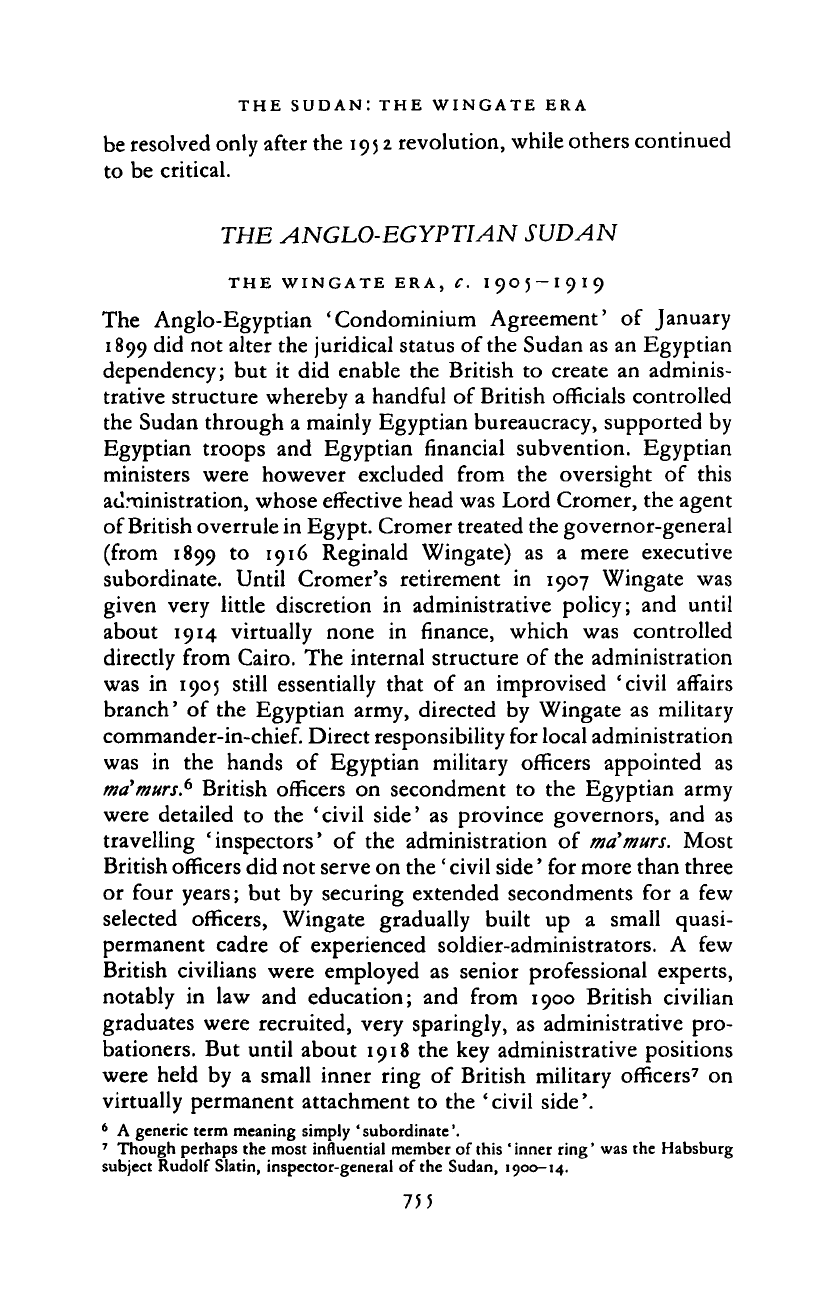
THE SUDAN: THE WINGATE ERA
be resolved only after the
195 2
revolution, while others continued
to be critical.
THE ANGLO-EGYPTIAN SUDAN
THE WINGATE
ERA, C.
I905-I919
The Anglo-Egyptian 'Condominium Agreement'
of
January
1899 did not alter the juridical status of the Sudan as an Egyptian
dependency; but
it
did enable the British
to
create
an
adminis-
trative structure whereby a handful of British officials controlled
the Sudan through a mainly Egyptian bureaucracy, supported by
Egyptian troops
and
Egyptian financial subvention. Egyptian
ministers were however excluded from
the
oversight
of
this
administration, whose effective head was Lord Cromer, the agent
of British overrule in Egypt. Cromer treated the governor-general
(from 1899
to
1916 Reginald Wingate)
as a
mere executive
subordinate. Until Cromer's retirement
in
1907 Wingate
was
given very little discretion
in
administrative policy;
and
until
about 1914 virtually none
in
finance, which
was
controlled
directly from Cairo. The internal structure
of
the administration
was
in
1905 still essentially that
of
an improvised 'civil affairs
branch'
of
the Egyptian army, directed
by
Wingate as military
commander-in-chief. Direct responsibility for local administration
was
in the
hands
of
Egyptian military officers appointed
as
ma'murs.
6
British officers
on
secondment
to the
Egyptian army
were detailed
to the
'civil side'
as
province governors, and
as
travelling 'inspectors'
of
the administration
of
ma'murs.
Most
British officers did not serve on the 'civil side' for more than three
or four years; but by securing extended secondments
for a
few
selected officers, Wingate gradually built
up a
small quasi-
permanent cadre
of
experienced soldier-administrators.
A few
British civilians were employed
as
senior professional experts,
notably
in law and
education;
and
from 1900 British civilian
graduates were recruited, very sparingly,
as
administrative pro-
bationers. But until about 1918 the key administrative positions
were held
by a
small inner ring
of
British military officers
7
on
virtually permanent attachment
to
the 'civil side'.
6
A generic term meaning simply 'subordinate'.
7
Though perhaps the most influential member of this 'inner ring' was the Habsburg
subject Rudolf Statin, inspector-general
of
the Sudan, 1900-14.
755
Cambridge Histories Online © Cambridge University Press, 2008
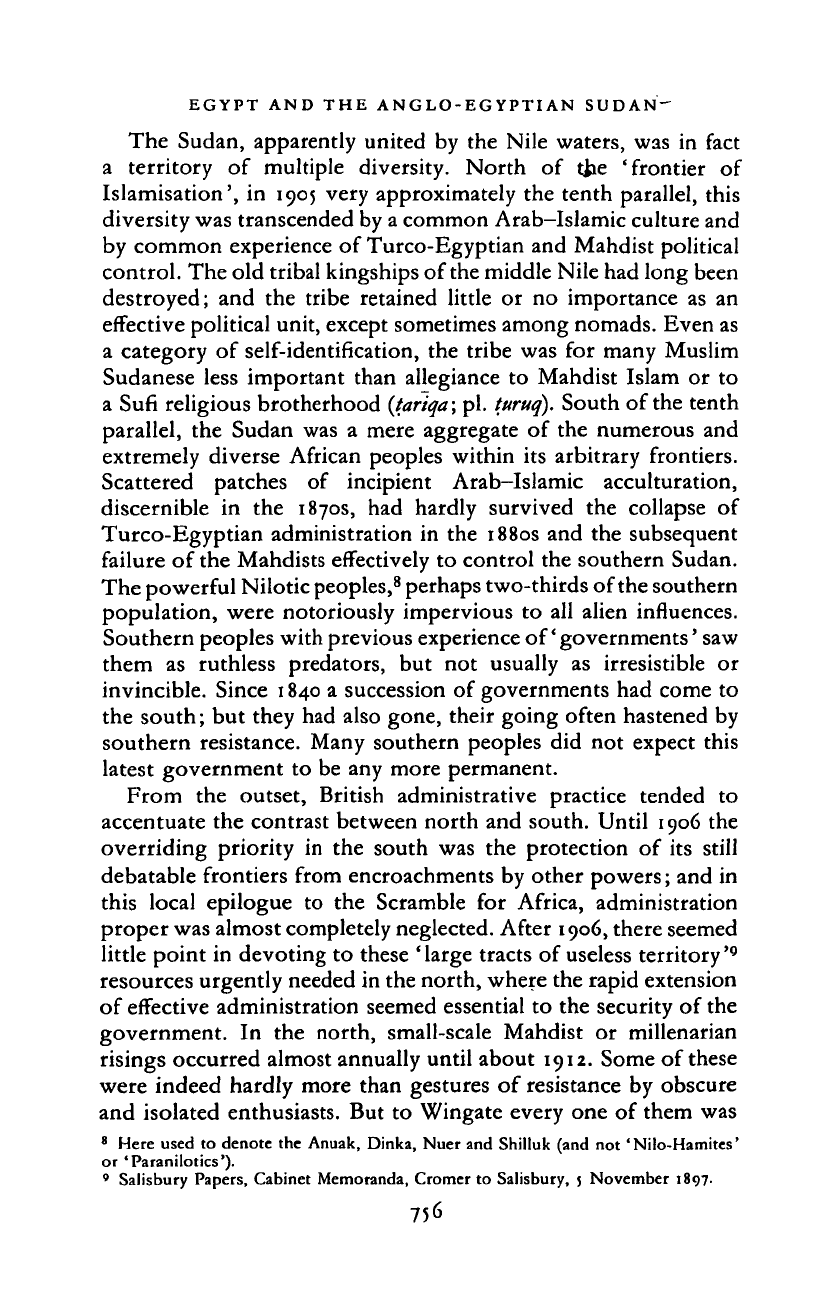
EGYPT AND THE ANGLO-EGYPTIAN SUDAN'
The Sudan, apparently united by the Nile waters, was in fact
a territory of multiple diversity. North of tjae 'frontier of
Islamisation', in 1905 very approximately the tenth parallel, this
diversity was transcended by a common Arab-Islamic culture and
by common experience of Turco-Egyptian and Mahdist political
control. The old tribal kingships of the middle Nile had long been
destroyed; and the tribe retained little or no importance as an
effective political unit, except sometimes among nomads. Even as
a category of self-identification, the tribe was for many Muslim
Sudanese less important than allegiance to Mahdist Islam or to
a Sufi religious brotherhood
{tariqa;
pi.
turuq).
South of the tenth
parallel, the Sudan was a mere aggregate of the numerous and
extremely diverse African peoples within its arbitrary frontiers.
Scattered patches of incipient Arab-Islamic acculturation,
discernible in the 1870s, had hardly survived the collapse of
Turco-Egyptian administration in the 1880s and the subsequent
failure of the Mahdists effectively to control the southern Sudan.
The powerful Nilotic peoples,
8
perhaps two-thirds of the southern
population, were notoriously impervious to all alien influences.
Southern peoples with previous experience of' governments' saw
them as ruthless predators, but not usually as irresistible or
invincible. Since 1840 a succession of governments had come to
the south; but they had also gone, their going often hastened by
southern resistance. Many southern peoples did not expect this
latest government to be any more permanent.
From the outset, British administrative practice tended to
accentuate the contrast between north and south. Until 1906 the
overriding priority in the south was the protection of its still
debatable frontiers from encroachments by other powers; and in
this local epilogue to the Scramble for Africa, administration
proper was almost completely neglected. After 1906, there seemed
little point in devoting to these ' large tracts of useless territory '
9
resources urgently needed in the north, where the rapid extension
of effective administration seemed essential to the security of the
government. In the north, small-scale Mahdist or millenarian
risings occurred almost annually until about 1912. Some of these
were indeed hardly more than gestures of resistance by obscure
and isolated enthusiasts. But to Wingate every one of them was
8
Here used to denote the Anuak, Dinka, Nuer and Shilluk (and not 'Nilo-Hamites'
or 'Paranilotics').
* Salisbury Papers, Cabinet Memoranda, Cromer to Salisbury, 5 November 1897.
756
Cambridge Histories Online © Cambridge University Press, 2008
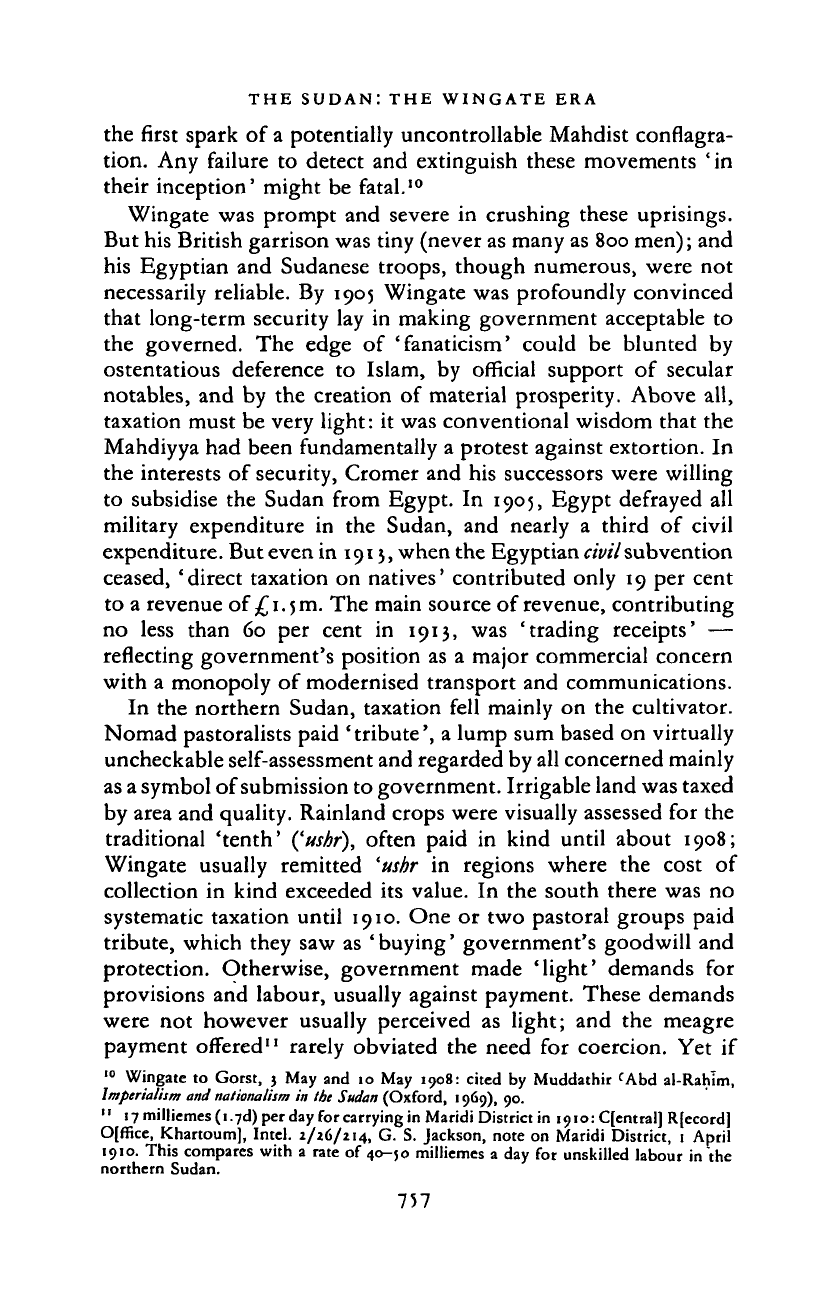
THE SUDAN: THE WINGATE ERA
the first spark
of
a
potentially uncontrollable Mahdist conflagra-
tion.
Any
failure
to
detect
and
extinguish these movements
'in
their inception' might
be
fatal.
10
Wingate
was
prompt
and
severe
in
crushing these uprisings.
But his British garrison was tiny (never as many as 800 men); and
his Egyptian
and
Sudanese troops, though numerous, were
not
necessarily reliable.
By
1905 Wingate was profoundly convinced
that long-term security
lay in
making government acceptable
to
the governed.
The
edge
of
'fanaticism' could
be
blunted
by
ostentatious deference
to
Islam,
by
official support
of
secular
notables,
and by the
creation
of
material prosperity. Above
all,
taxation must be very light:
it
was conventional wisdom that the
Mahdiyya had been fundamentally
a
protest against extortion.
In
the interests
of
security, Cromer and
his
successors were willing
to subsidise
the
Sudan from Egypt.
In
1905, Egypt defrayed
all
military expenditure
in the
Sudan,
and
nearly
a
third
of
civil
expenditure. But even in
1913,
when the Egyptian civil subvention
ceased, 'direct taxation
on
natives' contributed only 19
per
cent
to
a
revenue
of
£
1.5
m.
The main source
of
revenue, contributing
no less than
60 per
cent
in 1913, was
'trading receipts'
—
reflecting government's position
as a
major commercial concern
with
a
monopoly
of
modernised transport
and
communications.
In
the
northern Sudan, taxation fell mainly
on the
cultivator.
Nomad pastoralists paid 'tribute',
a
lump sum based
on
virtually
uncheckable self-assessment and regarded by all concerned mainly
as
a
symbol of submission to government. Irrigable land was taxed
by area and quality. Rainland crops were visually assessed
for
the
traditional 'tenth' ('ushr), often paid
in
kind until about
1908;
Wingate usually remitted 'ushr
in
regions where
the
cost
of
collection
in
kind exceeded
its
value.
In the
south there was
no
systematic taxation until 1910. One
or
two pastoral groups paid
tribute, which they saw
as
'buying' government's goodwill
and
protection. Otherwise, government made 'light' demands
for
provisions
and
labour, usually against payment. These demands
were
not
however usually perceived
as
light;
and the
meagre
payment offered" rarely obviated
the
need
for
coercion.
Yet if
10
Wingate
to
Gorst,
j
May and
10
May 1908: cited
by
Muddathir
c
Abd al-Rahlm,
Imperialism and
nationalism
in
the Sudan (Oxford, 1969),
90.
"
17
milliemes (1.7d) per day for carrying in Maridi District in
1910:
Qentral] R[ecord]
Offfice, Khartoum], Intel. 2/26/214,
G. S.
Jackson, note
on
Maridi District, 1 April
1910.
This compares with
a
rate
of
40-50 milliemes
a
day
for
unskilled labour
in the
northern Sudan.
757
Cambridge Histories Online © Cambridge University Press, 2008
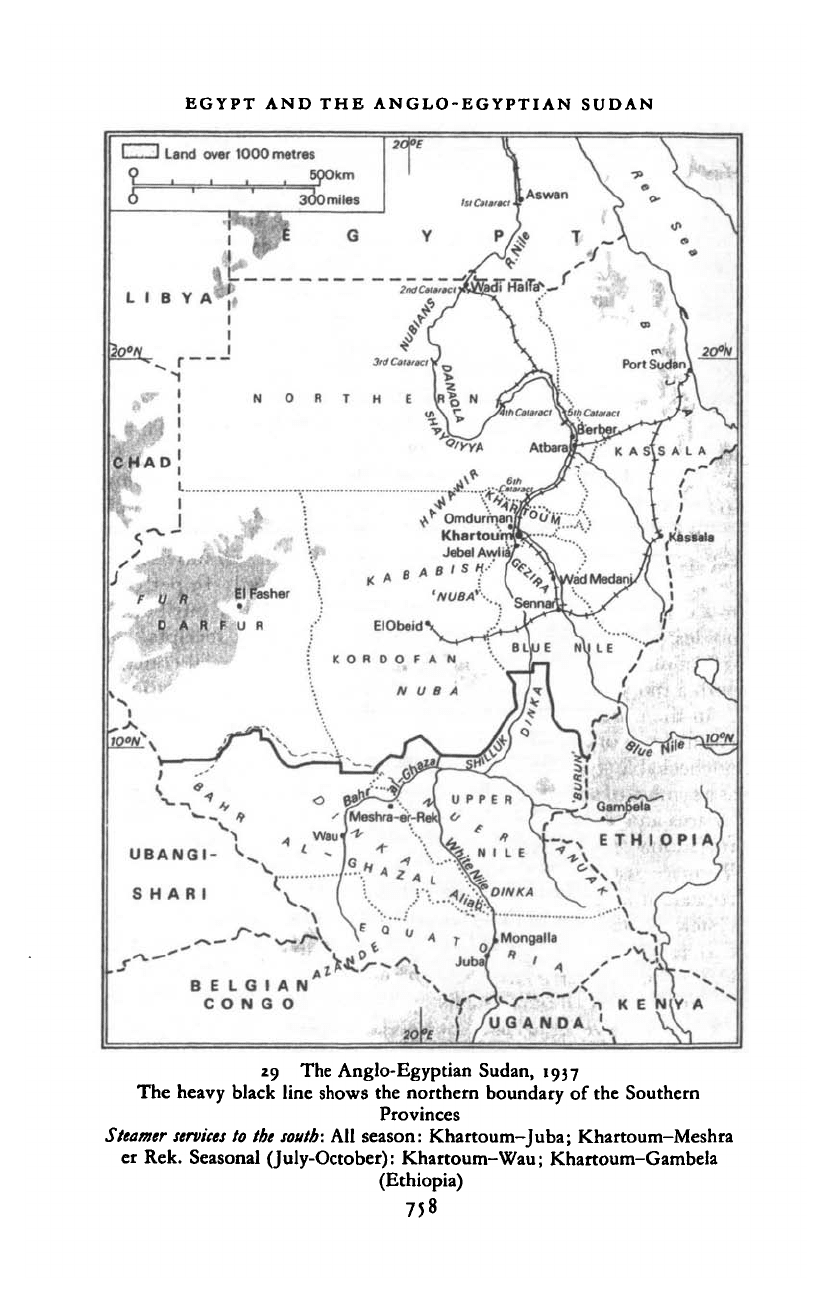
EGYPT AND THE ANGLO-EGYPTIAN SUDAN
L_ I Land over 1000 metres
9 .... 600km
20V>e
UBANGI-
S H ARI
BELGIAN
CONGO
29 The Anglo-Egyptian Sudan, 1937
The heavy black line shows the northern boundary of the Southern
Provinces
Steamer services
to
the
south:
All season: Khartoum-Juba; Khartoum-Meshra
er Rek. Seasonal (July-October): Khartoum-Wau; Khartoum-Gambela
(Ethiopia)
758
Cambridge Histories Online © Cambridge University Press, 2008
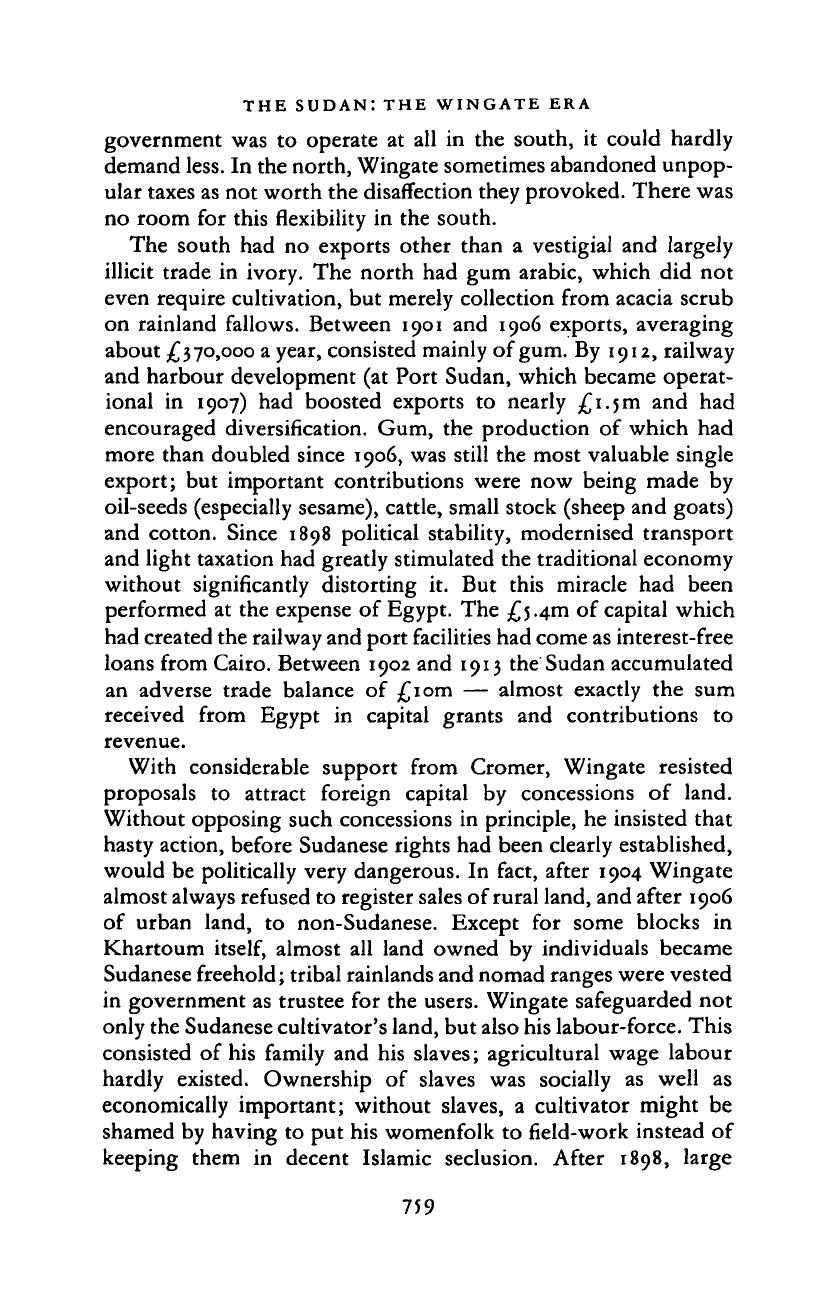
THE SUDAN: THE WINGATE ERA
government was
to
operate
at
all
in
the south,
it
could hardly
demand
less.
In the north, Wingate sometimes abandoned unpop-
ular taxes as not worth the disaffection they provoked. There was
no room for this flexibility in the south.
The south had no exports other than
a
vestigial and largely
illicit trade in ivory. The north had gum arabic, which did not
even require cultivation, but merely collection from acacia scrub
on rainland fallows. Between 1901 and 1906 exports, averaging
about £370,000 a year, consisted mainly of gum. By 1912, railway
and harbour development (at Port Sudan, which became operat-
ional
in
1907) had boosted exports
to
nearly £i,jm and had
encouraged diversification. Gum, the production
of
which had
more than doubled since 1906, was still the most valuable single
export; but important contributions were now being made
by
oil-seeds (especially sesame), cattle, small stock (sheep and goats)
and cotton. Since 1898 political stability, modernised transport
and light taxation had greatly stimulated the traditional economy
without significantly distorting
it. But
this miracle had been
performed at the expense of Egypt. The £5.4m of capital which
had created the railway and port facilities had come as interest-free
loans from Cairo. Between 1902 and 1913 the Sudan accumulated
an adverse trade balance
of
£iom
—
almost exactly the sum
received from Egypt
in
capital grants
and
contributions
to
revenue.
With considerable support from Cromer, Wingate resisted
proposals
to
attract foreign capital
by
concessions
of
land.
Without opposing such concessions in principle, he insisted that
hasty action, before Sudanese rights had been clearly established,
would be politically very dangerous. In fact, after 1904 Wingate
almost always refused to register sales of rural land, and after 1906
of urban land,
to
non-Sudanese. Except
for
some blocks
in
Khartoum
itself,
almost all land owned by individuals became
Sudanese freehold; tribal rainlands and nomad ranges were vested
in government as trustee for the users. Wingate safeguarded not
only the Sudanese cultivator's land, but also his labour-force. This
consisted
of
his family and his slaves; agricultural wage labour
hardly existed. Ownership
of
slaves was socially
as
well
as
economically important; without slaves,
a
cultivator might
be
shamed by having to put his womenfolk to field-work instead of
keeping them
in
decent Islamic seclusion. After 1898, large
759
Cambridge Histories Online © Cambridge University Press, 2008
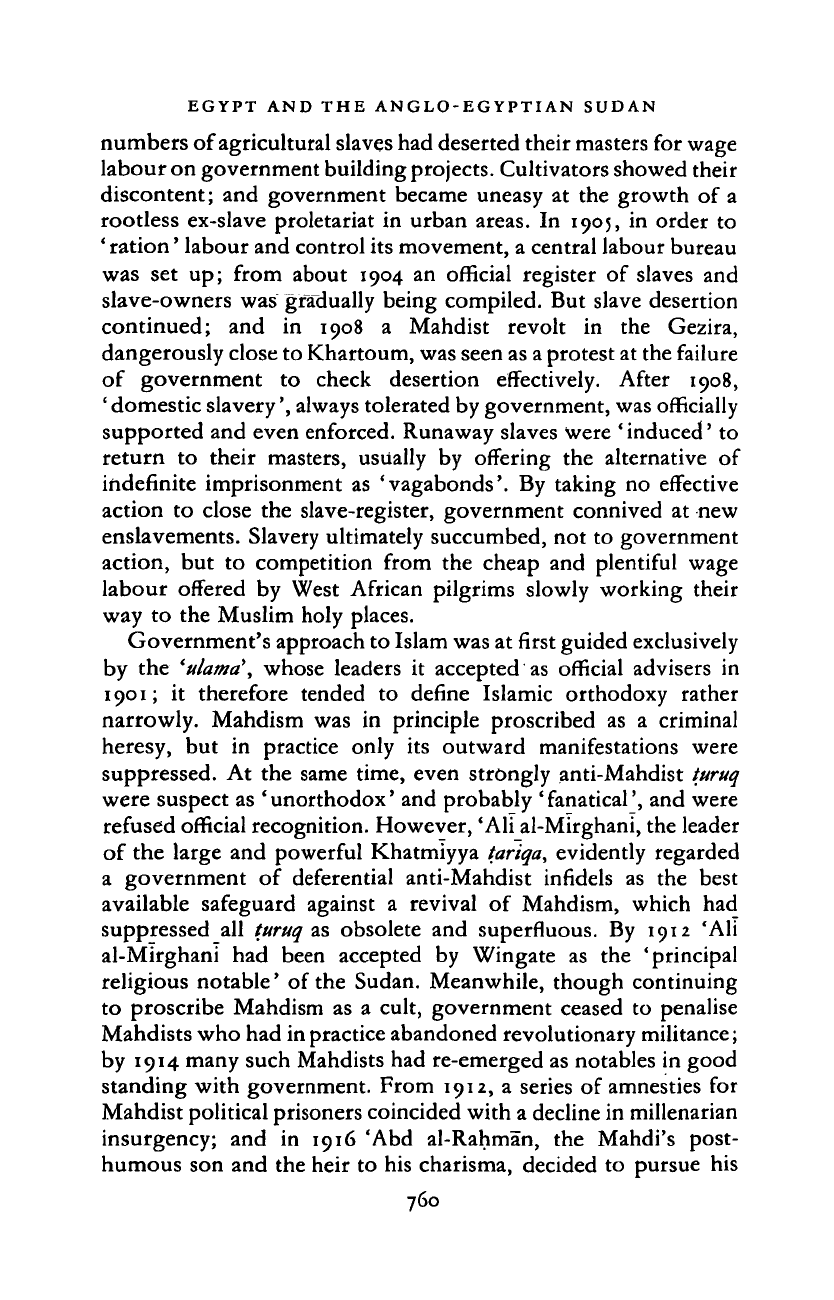
EGYPT AND THE ANGLO-EGYPTIAN SUDAN
numbers of agricultural slaves had deserted their masters for wage
labour on government building projects. Cultivators showed their
discontent; and government became uneasy
at
the growth of a
rootless ex-slave proletariat in urban areas.
In
1905, in order
to
' ration' labour and control its movement, a central labour bureau
was
set
up; from about 1904 an official register
of
slaves and
slave-owners was gradually being compiled. But slave desertion
continued;
and in
1908
a
Mahdist revolt
in the
Gezira,
dangerously close to Khartoum, was seen as
a
protest at the failure
of government
to
check desertion effectively. After
1908,
'domestic slavery', always tolerated by government, was officially
supported and even enforced. Runaway slaves Were ' induced' to
return
to
their masters, usually
by
offering the alternative
of
indefinite imprisonment as 'vagabonds'. By taking no effective
action to close the slave-register, government connived
at
new
enslavements. Slavery ultimately succumbed, not to government
action, but
to
competition from the cheap and plentiful wage
labour offered
by
West African pilgrims slowly working their
way to the Muslim holy places.
Government's approach to Islam was at first guided exclusively
by the 'ulama', whose leaders
it
accepted
as
official advisers
in
1901;
it
therefore tended
to
define Islamic orthodoxy rather
narrowly. Mahdism was
in
principle proscribed
as a
criminal
heresy,
but in
practice only
its
outward manifestations were
suppressed. At the same time, even strongly anti-Mahdist turuq
were suspect as 'unorthodox' and probably 'fanatical', and were
refused official recognition. However, 'Ali al-Mirghani, the leader
of the large and powerful Khatmiyya
tariqa,
evidently regarded
a government
of
deferential anti-Mahdist infidels
as
the best
available safeguard against
a
revival
of
Mahdism, which had
suppressed all turuq as obsolete and superfluous.
By
1912 'Ali
al-Mirghani
had
been accepted
by
Wingate
as the
'principal
religious notable' of the Sudan. Meanwhile, though continuing
to proscribe Mahdism as
a
cult, government ceased to penalise
Mahdists who had in practice abandoned revolutionary militance;
by 1914 many such Mahdists had re-emerged as notables in good
standing with government. From 1912,
a
series of amnesties for
Mahdist political prisoners coincided with a decline in millenarian
insurgency;
and in
1916 'Abd al-Rahman,
the
Mahdi's post-
humous son and the heir to his charisma, decided to pursue his
760
Cambridge Histories Online © Cambridge University Press, 2008
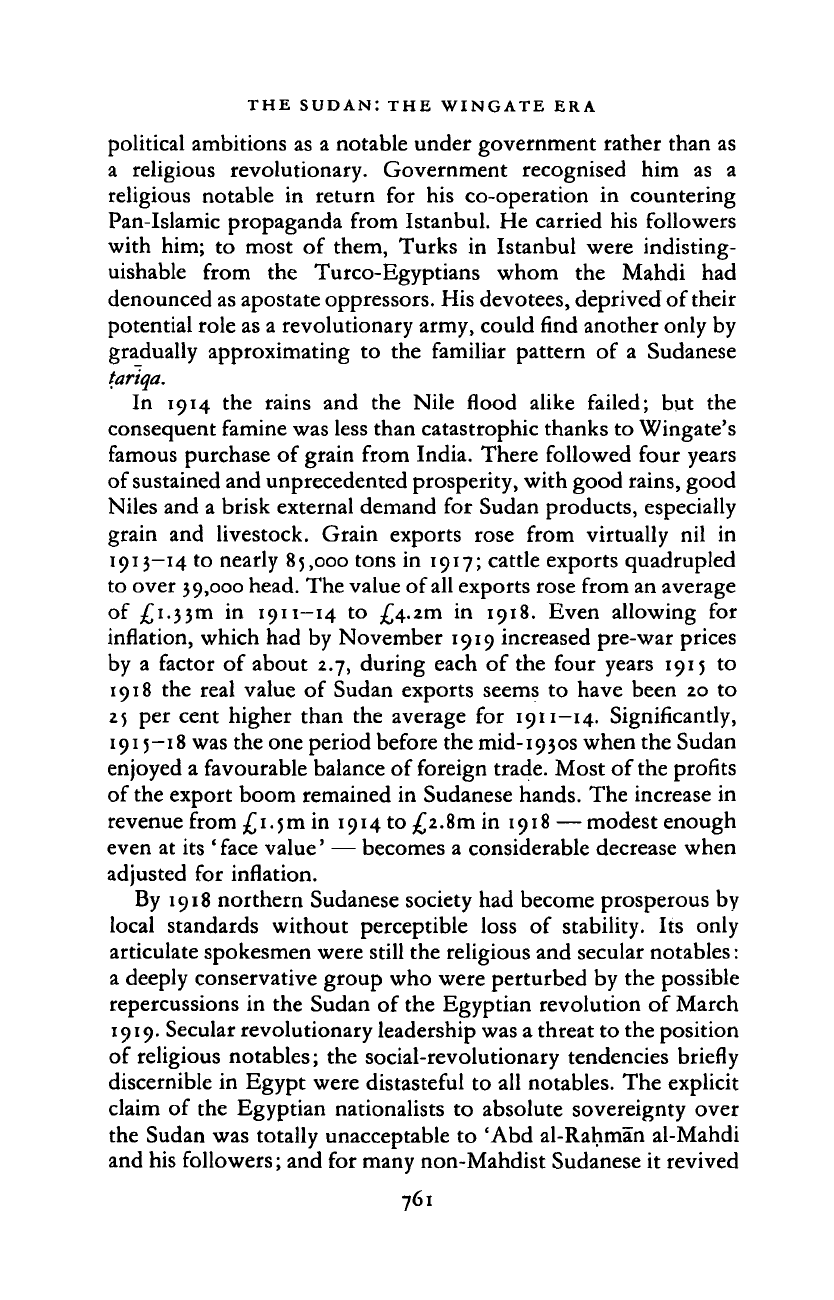
THE SUDAN: THE WINGATE ERA
political ambitions as a notable under government rather than as
a religious revolutionary. Government recognised
him as a
religious notable
in
return
for
his co-operation
in
countering
Pan-Islamic propaganda from Istanbul. He carried his followers
with him;
to
most
of
them, Turks
in
Istanbul were indisting-
uishable from
the
Turco-Egyptians whom
the
Mahdi
had
denounced as apostate oppressors. His devotees, deprived of their
potential role as a revolutionary army, could find another only by
gradually approximating
to
the familiar pattern
of a
Sudanese
tariqa.
In 1914
the
rains and
the
Nile flood alike failed;
but the
consequent famine was less than catastrophic thanks to Wingate's
famous purchase of grain from India. There followed four years
of sustained and unprecedented prosperity, with good rains, good
Niles and a brisk external demand for Sudan products, especially
grain and livestock. Grain exports rose from virtually
nil in
191}—14 to nearly 85,000 tons in 1917; cattle exports quadrupled
to over 39,000 head. The value of all exports rose from an average
or
"
£
I
-33
m
*
n
1911—14
to
£4.2111
in
1918. Even allowing
for
inflation, which had by November 1919 increased pre-war prices
by
a
factor of about 2.7, during each
of
the four years 1915
to
1918 the real value
of
Sudan exports seems
to
have been 20
to
25 per cent higher than the average
for
1911—14. Significantly,
1915 -18 was the one period before the mid-19 3 os when the Sudan
enjoyed a favourable balance of foreign trade. Most of the profits
of the export boom remained in Sudanese hands. The increase in
revenue from ^i.jm in 1914 to £2.8m in 1918 — modest enough
even at its 'face value' — becomes a considerable decrease when
adjusted for inflation.
By 1918 northern Sudanese society had become prosperous by
local standards without perceptible loss
of
stability.
Its
only
articulate spokesmen were still the religious and secular notables:
a deeply conservative group who were perturbed by the possible
repercussions in the Sudan of the Egyptian revolution of March
1919.
Secular revolutionary leadership was a threat to the position
of religious notables; the social-revolutionary tendencies briefly
discernible in Egypt were distasteful to all notables. The explicit
claim
of
the Egyptian nationalists
to
absolute sovereignty over
the Sudan was totally unacceptable to 'Abd al-Rahman al-Mahdi
and his followers; and for many non-Mahdist Sudanese it revived
761
Cambridge Histories Online © Cambridge University Press, 2008
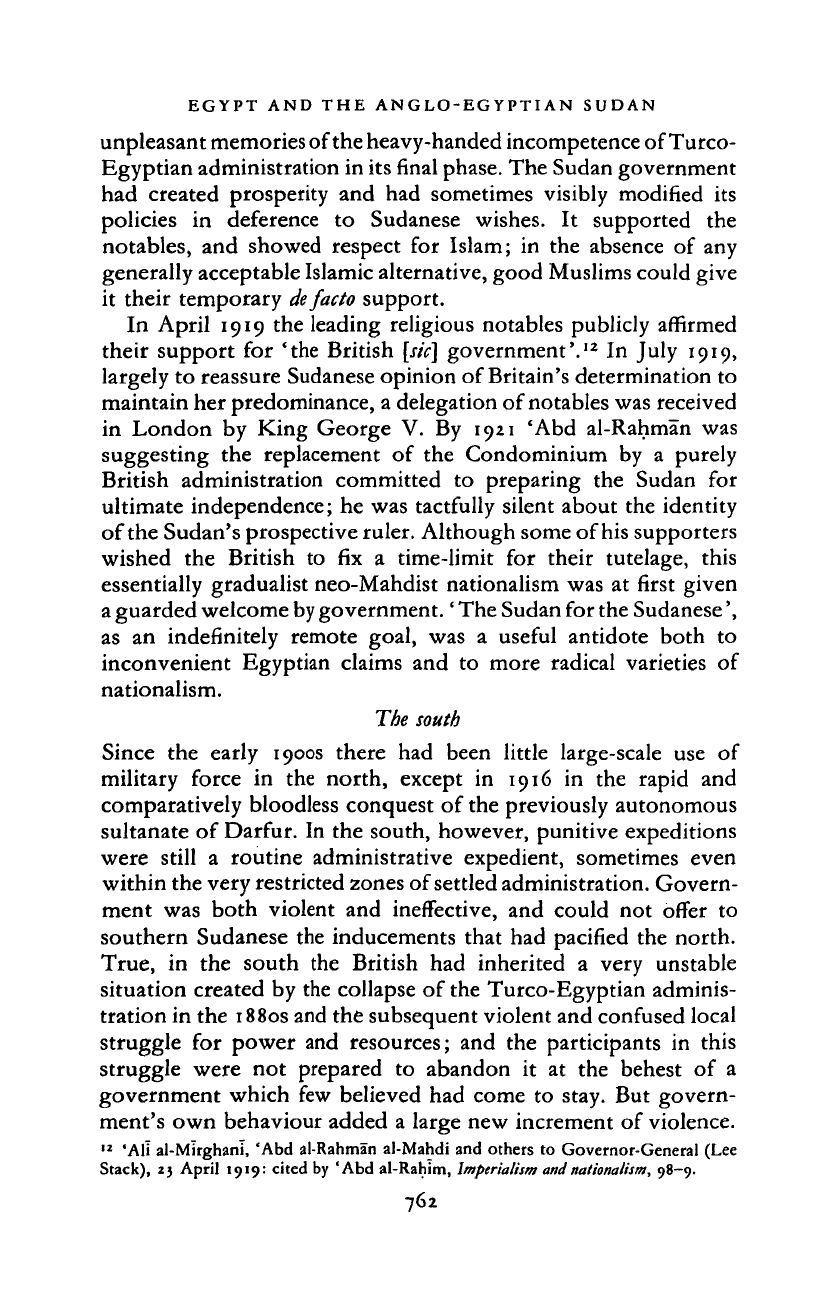
EGYPT AND THE ANGLO-EGYPTIAN SUDAN
unpleasant memories of the heavy-handed incompetence of Turco-
Egyptian administration in its final phase. The Sudan government
had created prosperity and had sometimes visibly modified its
policies in deference to Sudanese wishes. It supported the
notables, and showed respect for Islam; in the absence of any
generally acceptable Islamic alternative, good Muslims could give
it their temporary de facto support.
In April 1919 the leading religious notables publicly affirmed
their support for 'the British
[sic]
government'.
12
In July 1919,
largely to reassure Sudanese opinion of Britain's determination to
maintain her predominance, a delegation of notables was received
in London by King George V. By 1921 'Abd al-Rahman was
suggesting the replacement of the Condominium by a purely
British administration committed to preparing the Sudan for
ultimate independence; he was tactfully silent about the identity
of the Sudan's prospective ruler. Although some of his supporters
wished the British to fix a time-limit for their tutelage, this
essentially gradualist neo-Mahdist nationalism was at first given
a guarded welcome
by
government.' The Sudan for the Sudanese',
as an indefinitely remote goal, was a useful antidote both to
inconvenient Egyptian claims and to more radical varieties of
nationalism.
The south
Since the early 1900s there had been little large-scale use of
military force in the north, except in 1916 in the rapid and
comparatively bloodless conquest of the previously autonomous
sultanate of Darfur. In the south, however, punitive expeditions
were still a routine administrative expedient, sometimes even
within the very restricted zones of settled administration. Govern-
ment was both violent and ineffective, and could not offer to
southern Sudanese the inducements that had pacified the north.
True,
in the south the British had inherited a very unstable
situation created by the collapse of the Turco-Egyptian adminis-
tration in the 1880s and the subsequent violent and confused local
struggle for power and resources; and the participants in this
struggle were not prepared to abandon it at the behest of a
government which few believed had come to stay. But govern-
ment's own behaviour added a large new increment of violence.
12
'All al-Mlrghani, 'Abd al-Rahman al-Mahdi and others to Governor-General (Lee
Stack),
23 April 1919: cited by 'Abd al-Rahim,
Imperialism and
nationalism,
98-9.
762
Cambridge Histories Online © Cambridge University Press, 2008
